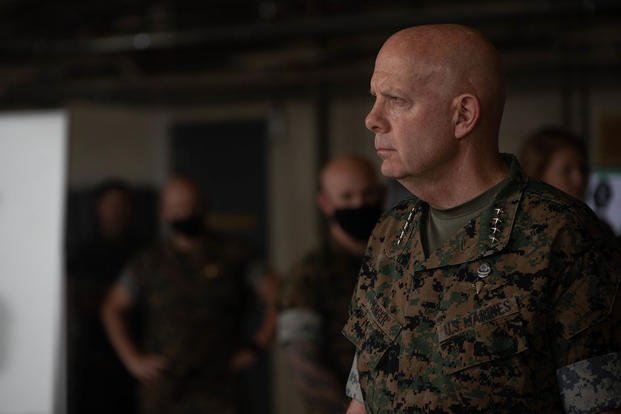The opinions expressed in this op-ed are those of the author and do not necessarily reflect the views of Military.com. If you would like to submit your own commentary, please send your article to opinions@military.com for consideration.
My father, a real-life "Saving Private Ryan" veteran (first wave, third landing craft to touch the sand at Normandy), taught me many things, including never to let opinion outweigh fact. To that point, one thing he said to me has resonated many times across the years: "Son, opinions are like a. …"
Well, you know the rest.
Gary Anderson's op-ed of Aug. 3 on Military.com is an example of my father's prophetic advice.
First and foremost, to so blatantly disparage any veteran days after his retirement, especially one like Gen. David Berger, who dedicated his entire life to the Marine Corps and moreover this nation in a myriad of roles including combat, is not only disrespectful, it's dishonorable!
More to the point, Mr. Anderson fails to properly identify the principal "why" in Commandant Berger's planning guidance. The general's force design was initiated to comply with the guidance of the 82nd Congress (80 years ago!) directing the Marines to remain most ready when our nation is least ready. As any defense analyst understands, we are now firmly focused on a new National Defense Strategy in keeping with a new era of great power competition in which we are arguably behind.
Mr. Anderson further fails to appropriately account for the roots of the modern U.S. Marine Corps amphibious operations and the architects of that capability -- initially, Lt. Col. Pete Ellis and later Commandant Ben Fuller. It was their "bold" and not always embraced Fleet Marine Force concept of the 1930s, coming from having been a land-centric force in World War I, that heralded the success of the Marine Corps' island-hopping campaigns of World War II.
Finally, Mr. Anderson alludes to the classified games at the Naval War College and what they may have indicated concerning Commandant Berger's vision. Thankfully, that's the reason they were classified. Had the findings indicated anything differently, the concept would have shifted. It hasn't.
Taking a page from Commandant Fuller, Commandant Berger looked at the "coming storm" and made the bold and courageous decision to realign the Marine Corps back to its amphibious roots. His redesign of the Corps took it from the land-centric force it had become during the War on Terror to a highly mobile, flexible and adaptable fighting force capable of engaging in island-hopping campaigns in the Pan Pacific theatre, reminiscent of the Marine Corps of old!
While Mr. Anderson dismissively alludes to the threat of a land-centric Marine Corps being consumed into the Army, having served as a senior adviser to a highly respected U.S. senator, those types of "economies of scale" initiatives are often discussed by the uninitiated on Capitol Hill. As history has also educated us, anything Congress considers could occur.
Finally and most especially, Commandant Berger "sold" his concept to seasoned experts in the Pentagon, including Gen. Jim Mattis, then the secretary of defense, a fellow highly decorated Marine, and the Honorable Richard V. Spencer, the 76th secretary of the Navy and another former Marine. 'Nuff said!
No, Commandant Berger's vision to redesign the Corps does not mark him as Mr. Anderson opines. Rather, having the honor to serve with Commandant Berger, I watched a gentleman and a committed patriot who greatly loved the Marine Corps check his own ego time and time again to do the right thing for the Corps, always placing "service above self."
The 37th commandant, Gen. Bob Neller, and my predecessor, Secretary Spencer, got it right in seeing Gen. David Berger become the 38th commandant of the Marine Corps. Thankfully, neither my opinion nor Mr. Anderson's matters, as history will be the final judge of Gen. Berger's efforts. But mark my words, if that coming storm does materialize, Gen. Berger will go down in the annals of Marine Corps history as the greatest commandant to ever serve our nation.
-- Kenneth J. Braithwaite, a retired Navy rear admiral, served as the ambassador to Norway during the Trump administration and later as the 77th secretary of the Navy.












